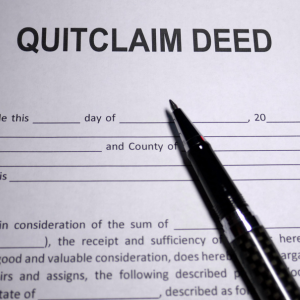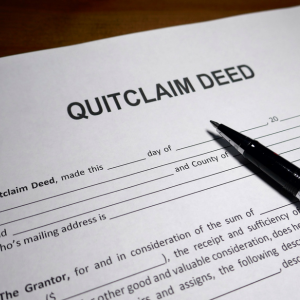
How to Obtain a Quit Claim Deed Form in Connecticut
What is the purpose of a quit claim deed form?

A quit claim deed form is a legal document that transfers property rights, ownership, or interest from one person to another without guarantees. This form is commonly used in real estate when those involved, such as family members or close friends, trust each other. Remember, a quit claim deed does not guarantee the grantor’s title or interest in the property; it only transfers whatever rights the grantor has.
Where can you find the official form in Connecticut?
In Connecticut, you can get the official quit claim deed form by visiting the town clerk’s office where the property is located. Town clerks provide the forms and ensure the document meets state requirements. You might also find forms online on the official county website or trusted legal sites. Be sure to use the correct form to avoid problems with the transfer process.
Are there any associated fees with obtaining the form?
Yes, there are usually fees for obtaining and recording a quit claim deed. These costs can vary by municipality and may include charges for notarization, filing, and administrative services. Contact the local town clerk’s office for an accurate estimate of the document processing fees in your area.
Do you need legal assistance to fill out the form?

Having a lawyer help fill out a quit claim deed form is not required, but seeking legal advice can be useful. A lawyer can guide you in completing the document accurately and ensure all legal aspects of the property transfer are covered. This is helpful if the transfer involves complex issues like joint ownership or possible liens. Consulting a legal professional can help prevent disputes and ensure a smooth transfer.
Completing the Connecticut Quit Claim Deed Form
When you complete a quitclaim deed form in Connecticut, include all necessary details. You’ll need the grantor’s name, the person giving up the property, and a precise legal description. Ensure you have the correct documents and use the right form to change the property title.
Are there specific guidelines for signatures on the form?
In Connecticut, the quitclaim deed must be signed before a notary public. The signature must be notarized, and sometimes, witnesses may need to watch you sign. Following these guidelines can help you avoid any legal problems.
How do you include property details accurately?

When filling in property details, use the legal description in previous deeds or legal papers. Mistakes here could cause issues with the property title change. Always check real estate records to ensure all deed information is accurate to avoid future disputes.
Is notarization mandatory for the quit claim deed in Connecticut?
Yes, notarization is required for a quitclaim deed in Connecticut. You need a notary to witness the signing, ensuring everything is legitimate officially. Notarizing the document helps protect everyone involved in the transaction and gets the deed accepted in public records.
By following these steps, you can smoothly handle the quitclaim deed process in Connecticut. For more detailed help, Valley Residential Group might offer additional resources and services.
Filing Your Completed Connecticut Quit Claim Deed
Where should the completed deed be filed?

To file your completed Connecticut quit claim deed, take it to the correct deed recording office. This is usually the town clerk or county recorder where your property is located. Each town in Connecticut may have different filing locations, so check to make sure you’re going to the right place. Doing this will help ensure your quitclaim deed is properly recorded, and your property transfer is official.
What are the filing fees?
Consider the various fees when you file a quit claim deed in Connecticut. Filing fees can vary but usually cover document processing. There might also be a real estate transfer tax that adds to the cost. Check with the specific recording office for the accepted payment methods and any extra taxes you might need to pay.
Can the deed be filed electronically in Connecticut?

Connecticut allows electronic filing for quit claim deeds, letting you submit online using e-filing systems. This makes the deed recording process easier and faster. Make sure to verify if your town’s recording office supports electronic filing. This can help speed up your submission and make the whole process quicker.
How long does the filing process usually take?
The time it takes to process a quit claim deed in Connecticut can differ. The waiting period depends on how busy the specific recording office is and if there are any submission errors. On average, give enough filing time to finish without problems. Contact the town clerk or county recorder for a more exact estimate of the expected time frame.
Legal Implications of Filing a Quit Claim Deed
Does a quit claim deed affect property taxes?
A quit claim deed in Connecticut doesn’t directly change your property taxes. However, it can have an indirect impact if ownership changes prompt a reassessment. This reassessment might alter your tax obligations. Additionally, a real estate transfer tax in Connecticut could apply during such transfers.
How does it differ from other property transfer methods?
Quit claim deeds and warranty deeds are different in key ways. A quit claim deed transfers ownership but doesn’t guarantee the title is clear. In contrast, a warranty deed assures any title issues. Knowing these differences is important when transferring property ownership in Connecticut’s real estate market.

What are the risks associated with quit claim deeds?
There are several risks tied to quitclaim deeds. One major issue in Connecticut is that they don’t offer a warranty about the title’s legality or encumbrances. This lack of protection can be risky, especially in situations like legal separations requiring fair distribution. Understanding real estate law can help you avoid pitfalls when using a quit claim deed.
Will filing a quit claim deed affect mortgage agreements?
Filing a quit claim deed might change existing mortgage agreements. Lenders may see it as a modification of the original mortgage terms. If you’re in Connecticut, seeking legal advice on Quit Claim Deeds can help you understand how such filings might affect your mortgage. It’s wise to talk to your lender before proceeding to avoid unexpected problems.
Additional Resources for Connecticut Property Transfers
What online tools are available for deed preparation?
![how to fill out quitclaim deed in market_city]](https://image-cdn.carrot.com/uploads/sites/78275/2024/12/how-to-fill-out-quitclaim-deed.png)
Online tools can make creating a quitclaim deed in Connecticut easier. These tools provide access to the forms and legal steps you need for deed preparation. Many sites offer step-by-step guides, helping ensure your information is correct and follows state rules. Choose platforms that provide templates reviewed by experts to ensure your document is valid.
Are there workshops or seminars available to help you understand property deeds?
In Connecticut, you can find workshops and seminars about property deeds. These events are led by real estate experts, who discuss important topics like legal requirements and how to read deed language. Attending these sessions can help you understand the processes involved in real estate transactions.
Who can assist with complex property transfer issues?

If you have complex property transfer issues in Connecticut, it’s wise to seek help from a lawyer who knows real estate. They offer legal advice and handle tricky property matters. Real estate lawyers are skilled at ensuring every part of the transfer is done legally and correctly. Consulting them can help protect your interests and avoid problems.
How can you verify the legitimacy of your quit claim deed?
To check if your quit claim deed is legal in Connecticut, you should look at land records and follow legal steps. Start by visiting the county’s land records office online or in person to verify the deed. All documents must be notarized and recorded correctly. Getting help from a real estate lawyer or a trusted title company can also confirm the deed’s authenticity and compliance with state laws.
This information applies to Connecticut and its cities, including Hartford, West Hartford, Meriden, Cheshire, and more. For more details, please call us at (860) 589-4663 or visit our website at Valley Residential Group LLC.
FAQs:
What is a quit claim deed, and how is it used in Connecticut?
A quit claim deed is a legal document that transfers property interest from one person, the grantor, to another. In Connecticut, divorce or legal separation is often used to give sole ownership of property to one person. It must be notarized to be legally valid.
How do I file a quit claim deed in Connecticut?
To file a quit claim deed in Connecticut, complete the correct form, have the grantor sign it before a notary, and submit it to the local town clerk’s office for recording. Check your town’s website for specific details.
Are Connecticut quit claim deeds applicable for real estate transfers involving partnerships or LLCs?
Yes, quit claim deeds can be used for real estate transfers involving partnerships or LLCs in Connecticut. It is a good idea to consult a lawyer to ensure compliance with state laws and business needs.
Can a quit claim deed affect child custody or alimony decisions?
A quit claim deed does not directly impact child custody or alimony. However, the property transfer might be considered in financial evaluations during a divorce. It’s best to consult a family law attorney for advice.
What are the potential tax implications when filing a quit claim deed in Connecticut?
Filing a quit claim deed in Connecticut may have tax implications like real estate conveyance taxes or changes in property tax assessments. Consult a tax professional to understand how these might affect you.
Is a power of attorney necessary when filing a quit claim deed?
A power of attorney isn’t needed unless the grantor cannot sign the deed personally. In such cases, a power of attorney allows someone to sign on behalf of the grantor.
What documents should accompany a quit claim deed for it to be valid?
Along with the quit claim deed, you might need documents like agreements between parties, notarization acknowledgment, and information on any encumbrances to ensure smooth recording.
Is a quit claim deed sufficient for transferring properties where survivorship rights are involved?
If survivorship rights are involved, ensure the quit claim deed addresses them. Consult a lawyer to avoid unintended consequences and ensure the deed fits your situation.
Key Insights
- Easily apply for a quit claim deed in Connecticut using the correct forms that meet state requirements.
- Get help with legal issues like complaints, annulment, adoption, or bankruptcy from professional lawyers and executors.
- Learn about Connecticut real estate agreements, including lease terms and documents like wills and covenants.
- Access free Connecticut deed forms, upload needed documents, and have them properly notarized to follow the rules.
- Use our resources for definitions and sample forms to quickly understand legal language and annotations.
- Handle different parts of Connecticut real estate, like filing for DBAs or a sole proprietorship, and learn about tax liabilities and employee rights, such as FMLA.
- Use our tools for easy document handling, including print-friendly formats, acknowledgment forms, and judgment recording.
- Understand Connecticut’s legal system, focusing on notary services, acknowledgment clauses, and witness needs for proper paperwork.
- Check out more resources about LLCs, promissory notes, and money dealings for your real estate needs.
- Trust expert support to complete your quit claim deeds and other legal tasks efficiently and make sure they are recorded.


